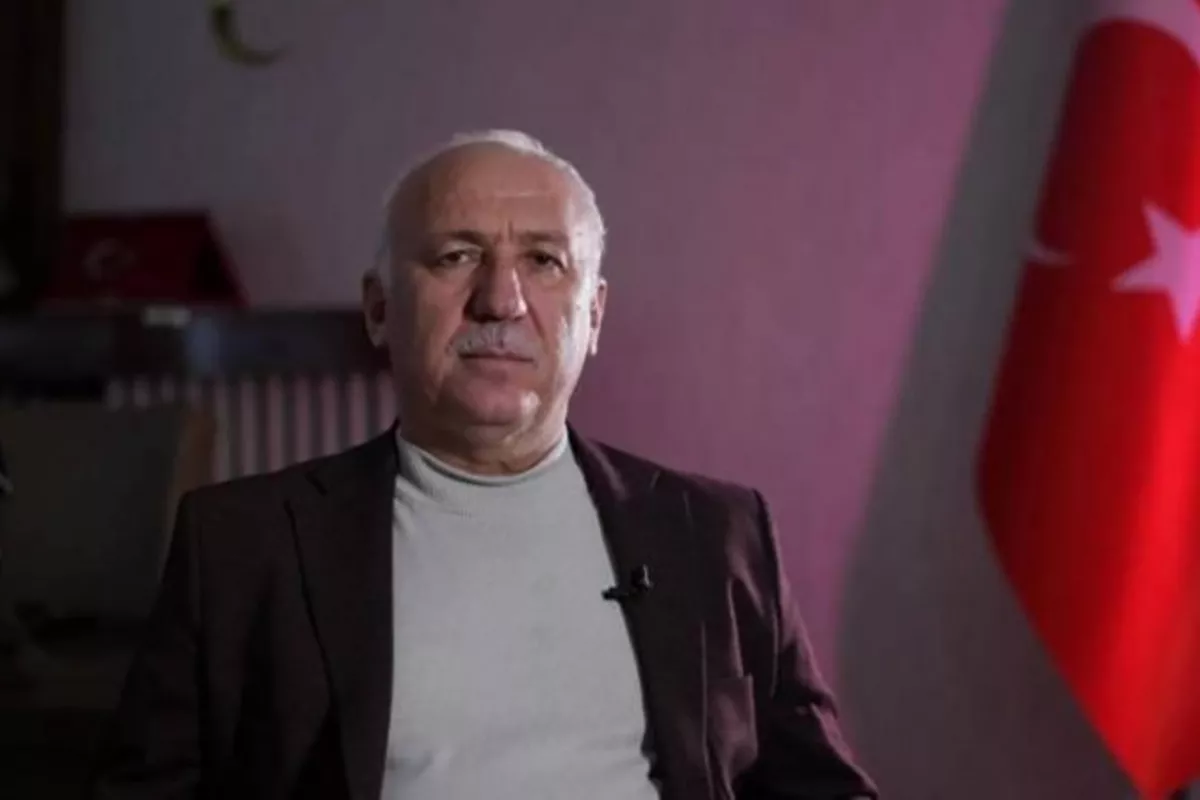
Photo: Hasan Oktay, Chairman of the Caucasus Strategic Research Center
The United States has hosted a landmark agreement between Azerbaijan and Armenia, mediated by U.S. President Donald Trump. The accord, signed in Washington, is considered an initial step toward lasting peace in the South Caucasus after decades of tension. It lays the groundwork for further negotiations on key issues, including border openings, territorial integrity, and regional cooperation.
The Caspian Post spoke with Hasan Oktay, Chairman of the Caucasus Strategic Research Center (KAFKASSAM) and a well-known political analyst.
- An agreement was signed between Azerbaijan and Armenia in the United States through Trump’s mediation. What do you think about the significance of this agreement?
- At a time when Trump is experiencing serious domestic tension in the United States-particularly after Medvedev’s statement, “We are not like Iran”-the U.S. announced it would send two military submarines to waters close to Russia. Shortly thereafter, it was announced that Pashinyan and Aliyev would hold a joint meeting with Trump in Washington and sign a protocol, considered an initial step toward peace, at a press conference.
Subsequently, U.S. envoy Vitkov visited Moscow, first meeting with lower-level officials and later with Putin. Realizing that Trump was making a strategic move against him through Aliyev and Pashinyan, Putin expressed his readiness to negotiate with Trump. This became a political maneuver that somewhat overshadowed the Washington meeting between Pashinyan and Aliyev.
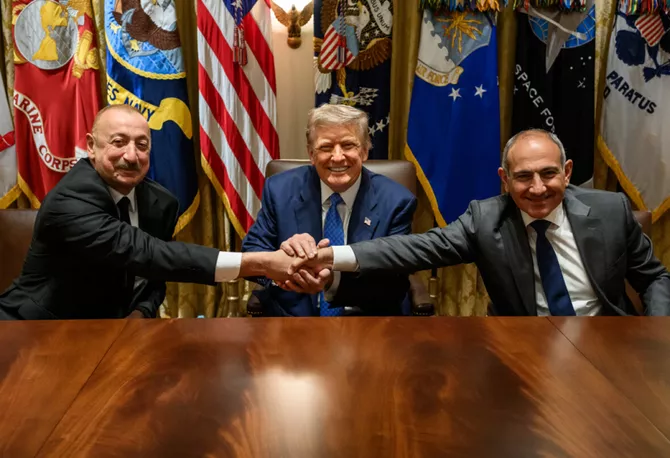
Photo: OC Media
In other words, Trump’s attempt to create a situation in the South Caucasus similar to the Ukraine crisis vis-à-vis Russia-and to resolve it through a peace agreement-was counterbalanced by Putin’s response, “I will meet with Trump.” The meeting in Washington is not a full peace treaty but more of a protocol of understanding, as the sides have not yet agreed on key issues such as recognition of territorial integrity and the opening of borders.
- What legal and practical obstacles still remain to the implementation of the final peace agreement between Azerbaijan and Armenia?
- Naturally, there are still many legal and practical obstacles to implementing the final peace agreement between Azerbaijan and Armenia. For example, amendments to Armenia’s constitution regarding Nagorno-Karabakh-meaning recognition of Azerbaijan’s territorial integrity-as well as issues such as customs, security, and land transport rights.
As is known, in earlier lower-level meetings, the parties discussed approximately 18 articles. The Azerbaijani side insists on changing the Armenian constitution. This has both advantages and disadvantages. The disadvantage is that this is an issue that can only be resolved over time. It is not currently possible to amend the Armenian constitution because the opposition in Armenia has formed a serious alliance against Pashinyan, and the church has also joined in. In such an atmosphere, Pashinyan faces serious challenges in changing the constitution, passing it through parliament, and securing presidential approval.
Therefore, Azerbaijan’s demand for constitutional change is prolonging the peace process. In addition, the issue of approximately $150 billion in war reparations remains on the agenda. This demand, along with the constitutional amendment, is frequently emphasized in the writings of Azerbaijani officials and academics in Türkiye. Of course, since it is impossible for Armenia to pay $150 billion in reparations to Azerbaijan (given Armenia’s economy and budget), this is another factor delaying peace.
The delimitation of borders is almost complete. Preparations for opening border crossings are ongoing. Here, trilateral relations between Azerbaijan, Armenia, and Türkiye-and even delays in peace-are leading to the involvement of new players (such as the United States). Therefore, although a preliminary agreement was signed by the U.S. as an initial step toward peace, transforming the November 10, 2020 ceasefire agreement into a peace treaty still does not seem possible.
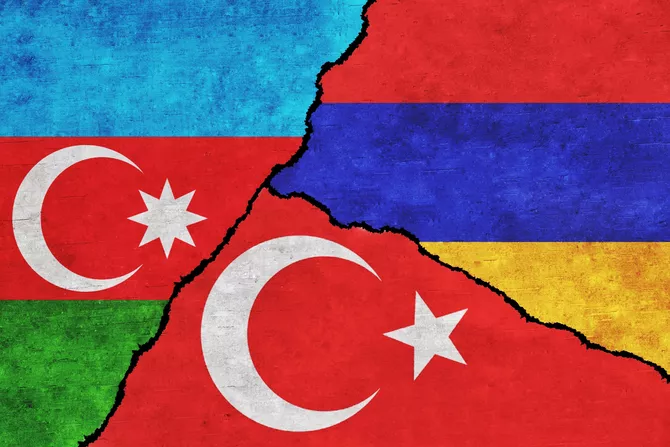
Photo: Daily Sabah
Meanwhile, the process regarding the Zangezur Corridor continues. In fact, the term “Zangezur Corridor” is mentioned in the 9th article of the November 10 agreement as “restoration of transport and communication routes from the Soviet era.” Azerbaijani and Turkish officials have turned this into an expectation for the Zangezur Corridor.
If a stable peace treaty were signed, all border crossings opened, and mutual transport and communication routes activated-similar to the European Union-then the expectation for a Zangezur Corridor (initially under Russian control) would emerge. However, due to the Russia-Ukraine war and issues surrounding the Lachin Corridor, this topic has been left off the table. In the U.S. meeting, however, there was talk of a route called the “Trump Road,” which passes north of Iran and is one of the most prominent on the map. This corridor was envisioned to be managed by Trump and even American companies.
Yet, although expressed formally, it does not appear feasible in practice. We might even call it the “Crazy Dumrul Bridge.” As is known from the “Book of Dede Qorqud,” Crazy Dumrul built a bridge over a dry ravine, charging five coins to cross and ten coins to not cross.
Currently, the Lachin and Zangezur corridors resemble such a “Crazy Dumrul Bridge,” because if, after the November 10 ceasefire, a trilateral peace involving Türkiye were established, a bus or car departing from Yerevan could easily reach Igdir or Kars using old roads. But descending south into northern Iran, then going to Nakhchivan and from there to Türkiye, would mean roughly 200 km of additional distance.
Thus, the Zangezur Corridor becomes more of a political symbol than an ordinary road. Even if the U.S. wanted to control this corridor, it would increase Iranian and Russian pressure in the region. In fact, next week Iranian President Raisi is expected to visit Armenia and sign a high-level cooperation agreement. This shows that Iran moved to protect its regional interests immediately after the U.S. meeting.
Therefore, signing peace soon-especially if Pashinyan’s government wins next year’s elections and a more stable Armenia emerges-is crucial. Such a peace treaty should ensure that Azerbaijan and Türkiye have access to almost every part of Armenia. Restricting access solely to the Zangezur Corridor might fulfill Azerbaijan’s goal of “transport from homeland to homeland without seeing an Armenian face,” but it would be another version of Crazy Dumrul’s story.
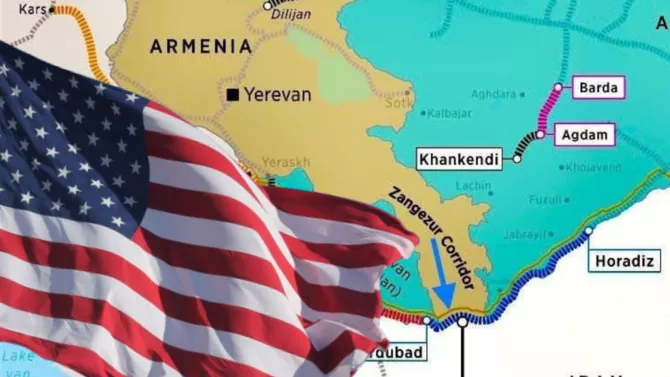
Photo: APA
To prevent Armenia from returning to revanchist rule, to transform it into an Armenia accustomed to living alongside Turks, and to block other powers from entering the South Caucasus, it is essential to quickly establish trilateral peace-signed in Istanbul. Ideally, this peace agreement should, in the coming days, be signed trilaterally between Türkiye, Armenia, and Azerbaijan in Istanbul. The U.S. meeting is regarded as an agreement document on the road to peace. Therefore, Trump’s invitation of the two South Caucasus leaders to Washington to strengthen his hand against Putin will be discussed even more in the future.
The operation of the Zangezur Corridor is not possible, as this issue is expected to be raised during the Iranian president’s visit to Armenia next week. In addition, the meeting between Trump and Putin in Alaska on the 15th of this month will play an important role in shaping the future.
However, Türkiye does not want a new balance of power to emerge in the South Caucasus and instead desires a stable process in the region through trilateral peace.
- Which international and regional organizations will be affected by the document signed by the U.S., Azerbaijan, and Armenia?
- This is a significant gain for Azerbaijan. While raising the issues of constitutional amendments and reparations, Azerbaijan was also demanding the dissolution of the OSCE Minsk Group. The Minsk Group has three co-chairs: France, Russia, and the United States. The U.S. indicating that it would propose dissolving the Minsk Group is a highly significant success for Azerbaijan.
Additionally, the repeal of Section 907-enacted during the First Karabakh War when U.S. sympathies for Christianity led to an arms embargo on Azerbaijan despite Armenia being the aggressor-would be another important diplomatic victory for Azerbaijan.
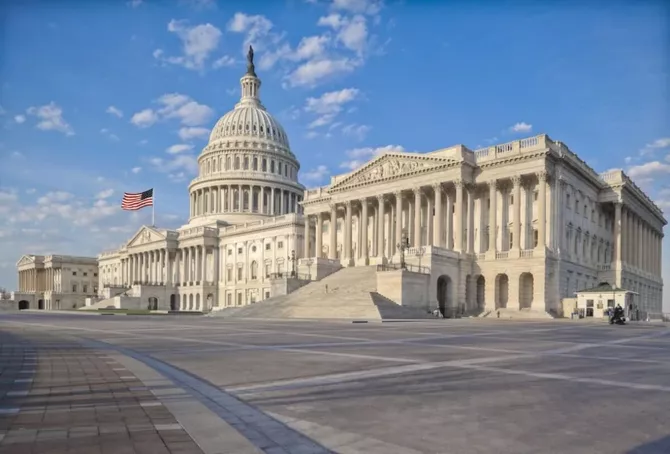
Photo: Reuters
In recent times, especially amid tensions in Azerbaijan-Russia relations and Azerbaijan’s rapprochement with Trump, it is clear that Azerbaijan is seeking more reliable allies in the region. One risk to consider is whether Russia might increase pressure on Azerbaijan despite Türkiye’s presence-similar to what happened in Ukraine and Georgia after the collapse of the Soviet Union. This is a critical issue, because Türkiye’s clear stance that it stands by Azerbaijan under all circumstances prevents Azerbaijan from falling into the same situation as Ukraine or Georgia in Russia’s eyes. Nevertheless, a possible reaction from Russia should still be taken into account.
In the future, Azerbaijan’s orientation will be toward the European Union and the United States, as it has the opportunity to sell its energy resources to the EU most easily-via Türkiye. Considering Georgia’s increasingly pro-Russian policy, delivering new energy supplies to Europe via Armenia could come onto the agenda, which would pass through a permanent Türkiye-Azerbaijan-Armenia route.
In Trump’s view, both Pashinyan and Aliyev have gained significant prestige. Since the world’s major news agencies focused on this meeting, both Armenia and Azerbaijan became the center of international attention, and diplomatic sources evaluated the meeting as highly significant.
However, it is necessary to closely monitor how this will take shape after the Alaska meeting-i.e., after the Putin-Trump meeting. For both Azerbaijani and Turkish public opinion, the key point to stress is this: it is imperative to act immediately, without further delay, to strengthen the trilateral peace and prevent a possible Russian attempt to overthrow Pashinyan in a coup, ensuring his re-election. And the trilateral peace must be signed in Istanbul.
Share on social media